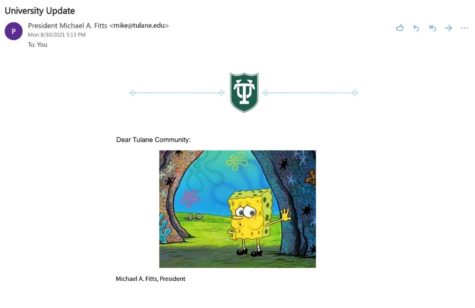OPINION | Tulane undersold Hurricane Ida’s potential
October 6, 2021

The Tulane University administration and faculty worked long hours to successfully keep students safe from Hurricane Ida, and they deserve much praise for doing so. In hindsight, it is clear that they made some errors when communicating with students and parents. Although it is easier to protest the school’s judgement than it is to respond to a natural disaster, it is our responsibility as students to point these mistakes out as fairly and concisely as possible.
Leading up to Ida, Tulane’s press releases repeatedly told students, “everyone should make their own decision — without fear of academic or employment repercussions — regarding whether they leave town for the duration of the storm.”
Giving each individual the freedom to leave or not allows students and parents to act according to their own risk tolerance and ability. Those who chose could feel secure sheltering in place with Tulane while those more risk averse can choose to evacuate.
The problem with this statement is that the freedom to choose whether to evacuate or not necessitates having the ability to assess the risk of Hurricane Ida.
The vast majority of Tulane students are not Louisiana residents and may have limited experience dealing with hurricanes. Tulane families rely on the school, and the information they provide to keep their children safe from storms. First- and second-year students are especially reliant; they do not have other storms to use as reference points, nor do they have experience interpreting New Orleans media coverage. Therefore, if Tulane is to entrust students with the responsibility to decide their own evacuation plans, it is incumbent upon them to communicate the storm’s risk clearly and honestly.
Tulane fell short of communicating the full extent of Ida’s potential destruction. As a result, many students stayed on campus who would otherwise not. According to a Tulane Hullabaloo survey, over half of the freshman students surveyed stayed for Ida.
In sharp contrast, the vast majority of upperclassmen, with more experience in New Orleans, fled. Junior Will Wagman remarked that his decision to stay “came down to just a lack of experience in a situation like this for me. The whole kind of process was just about, you know, calculating and trying to grasp the reality of what was about to happen.”
Tulane’s decision to run classes the Friday and Saturday before Sunday’s landfall was the first error which undermined Ida’s potential to students. On the practical side, this decision created unnecessary friction for students who would rather evacuate. For certain professors, there is no such thing as a class that can be missed without “academic repercussions.” Symbolically, not cancelling classes sent the message that Ida would not be too severe. This decision was especially strange since Tulane chose to cancel classes midday before Hurricane Sally’s landfall in 2020, a storm far less devastating to New Orleans.
Furthermore, the statements issued by President Mike Fitts during Ida’s lead-up left out key pieces of information. The emails sent out Friday evening and Saturday morning assured students New Orleans did not order a mandatory evacuation, but they did not mention why. Friday afternoon, Mayor LaToya Cantrell said in a press conference: “… the city cannot issue a mandatory evacuation because we don’t have the time. We have pivoted to voluntary evacuation. Absolutely, this is the time.”
The city did not issue a mandatory evacuation because of time constraints, not because of the hurricane’s projected impact. There is no excuse for not communicating this information; leaving it out seems to be a cheeky tactic to avoid raising alarm or outrage from parents.
The first Tulane projection of Ida, given Friday at noon, predicted wind speeds of 40 mph, wind gusts up to 60 mph and rainfall of 4-8 inches. Their forecast changed only slightly on Saturday evening when an Eastern shift of Ida upgraded the winds speeds to 70-85 mph with gusts of 95-100 mph.
Unfortunately, this final and most severe forecast came just after the window of time to safely evacuate. Tulane had stopped running shuttles to the airport an hour prior and recommended against an evacuation in their statement.
Though Tulane’s initial projections mentioned the hurricane’s unpredictability, they never explicitly stated Ida’s range of possibilities. Their Saturday evening statement noted that the storm’s shift “surprised forecasters” while the Tulane Twitter account reaffirmed the same sentiment with the tweet: “Ida’s path deviated from what forecasters had predicted as recently as yesterday morning.”
This tweet received huge backlash from the meteorological community. Many news anchors and weather professionals pointed out Ida’s impact was well-within the margin of error of what the National Hurricane Center projected. Marshall Shepherd, former president of the American Meteorological Society, wrote, “… the accuracy and consistency of the [National Hurricane Center] forecast for Ida was breathtakingly good … the Tweet in question, even if unintended, reinforced a lingering public narrative that we cannot forecast these storms (or weather) accurately.”
When preparing for a natural disaster, Tulane must worry about the storm itself, as well as concerned parents, rambunctious students and a national media spotlight. The slightest error in messaging can stir panic and hurt the school’s reputation for decades to come. To communicate properly under the weight of all of this is an extraordinarily difficult task, but if Tulane is not up for the challenge, why would any student choose to attend school in a city where hurricanes are intertwined with its culture?






















Leave a Comment